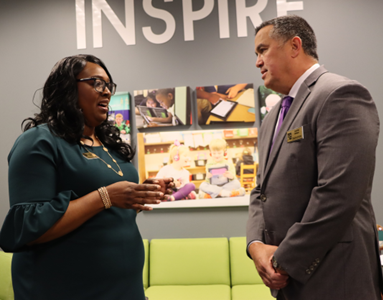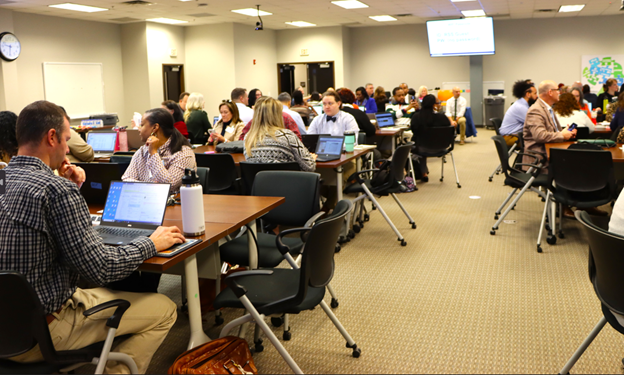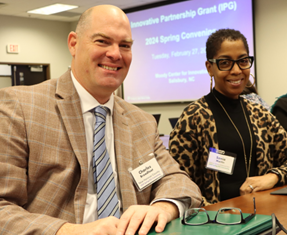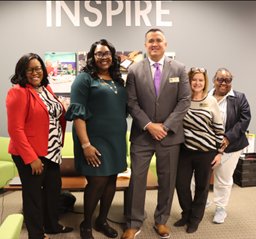Networking, Collaborating, Analyzing Challenges, and Sharing Effective Practices
The 2024 Innovative Partnership Grant (IPG) Spring Convening was held on February 27th & 28th at the Rowan-Salisbury Schools district office. More than 80 participants gathered to network, collaborate, analyze challenges, and share effective practices. The group in attendance included Principals and School Coaches from 13 Cohort II and 15 Cohort III IPG schools across the state, their District Liaisons, and external partners, as well as representatives from NCDPI.
Tenisea Madry, Statewide Program Administrator, Office of Federal Programs, North Carolina Department of Public Instruction (NCDPI), led the two-day event with a myriad of interesting activities that kept attendees engaged. Madry was joined by Tim Dryman, Consolidated West Section Chief, NCDPI.
First day goals were to:
- Provide time and space for the IPG Community of Practice to meet face-to-face to share and solve problems together.
- Engage members in networking and dialogue with one another.
- Cultivate intentional bonds and bridges among members of the community that extend the reach of the community.
- Support members in collaboration and collective advocacy.

The NCDPI established a competition to award Innovative Partnership Grants (IPG) to Comprehensive School Improvement (CSI) schools in the Spring of 2020, 2021, and 2023. This grant provides additional fiscal resources, technical supports, and site visits to help schools improve student achievement and, ultimately, to assist these schools with exiting the federal identification/status of CSI.

CSI schools participating in the IPG program are offered coaching and feedback to ensure continuous improvement. The Region 6 Comprehensive Center at SERVE, provides technical assistance to the North Carolina IPG team for planning and implementing support to the IPG-funded CSI schools, as well as provides supports to the IPG School Coaches, Principals, and District Liaisons community through ongoing virtual and face-to-face facilitated events and relevant resources.
Five key pillars of the IPG program include:
- Having a 12-month IPG School Coach at the school to assist leadership with the implementation of evidence-based school improvement strategies;
- Identifying an external partner who collaborates with the school to provide expertise to assist in fully and effectively implementing evidence-based school improvement strategies;
- Having a principal who is committed to the CSI school throughout the duration of the full implementation phase of the grant;
- Utilizing NCStar for school improvement planning; and
- Setting goals tracking goal for student achievement in reading/language arts, mathematics, and science.
One example of fostering networking and sharing of effective practices is when five schools from Cohort II shared some of their most successful practices in an “Around the World” activity. The five Cohort II teams invited to share, each took a portion of the room, while other attendees from Cohort II and Cohort III rotated around in intervals. Presenting schools included: Career Readiness Academy @Mosley, Fairview Elementary, Renaissance West STEAM Academy, Selma Middle School, and Vance County Middle School.

Charles Broadfoot, Principal, at the Career Readiness Academy at Mosley PLC, spoke about how their #1 goal has been to improve climate and culture at Mosely by integrating SEL practices into every classroom. He felt their efforts were successful – when the school was recently faced with closure, it was the students who fought for it to remain open. With just over 60 students, the Career Readiness Academy has the smallest enrollment in the state.
Principal Dwight Thompson, Renaissance West STEAM Academy, revealed that one of the first action steps he took after becoming principal in 2017 was to remove all in-school suspension. Thompson, whose school has over 800 students, was recently named Charlotte-Mecklenburg’s Principal of the Year in 2023. He uses community and corporate partnerships to implement a strong vision of success for students. The academy is a neighborhood school with a focus on academic achievement, youth programs, health and family services, and community engagement.
Teams also engaged in activities that allowed them to share some of the challenges they faced in their schools working in role-alike groups to present a Problem of Practice to their colleagues, who actively listened, engaged in inquiry, and brainstormed to provide possible solutions that could be implemented to help mitigate or solve the challenge at the school. Believing that the “wisdom is in the room” the Program Administrator provides a safe space for role-alike groups to openly discuss challenges with their peers, who may be facing similar challenges or has faced and found solutions.
At the end of Day One, all 13 teams from IPG Cohort II were celebrated for their positive results with a plaque to take back to their respective schools.
“We recognize outstanding dedication and successful three-year commitment to the Innovation Partnership Grant Cohort II Schools. Your unwavering commitment to innovation and excellence has significantly contributed to the advancement of learning,” Madry said.
Since Cohort III is in their first year of implementation, Day Two was designed to provide grantees with the opportunity to reflect on program implementation thus far and refine ideas for moving forward. The session also included a section on how to develop stakeholder engagement, performance monitoring of partnering organization, data tracking and reporting, and fiscal accountability. Participants had the opportunity to debrief through reflection, refinement, and learning from each other.

Pauletta Thompson, Tenisea Madry, Tim Dryman, Shauna Andrews, and
Toya Kimbrough.
“I have always been a proponent of school improvement, and I strongly believe that IPG provides that equity to put everyone on an equal playing field. The convening provided an opportunity for IPG schools across the state to network, collaborate, and share successes and challenges to make each of their schools better through support of IPG.”
Tim Dryman, NCDPI
Story and Photo: Judi Rossabi, Communications Specialist, SERVE





